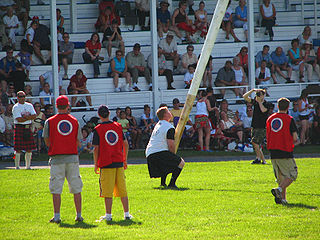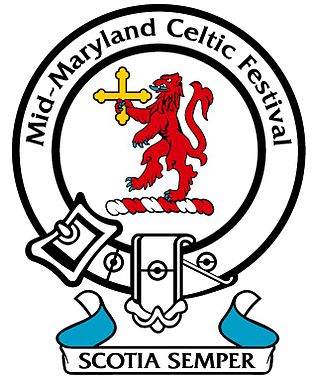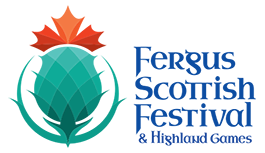
A pipe band is a musical ensemble consisting of pipers and drummers. The term pipes and drums, used by military pipe bands is also common.

The caber toss is a traditional Scottish athletic event in which competitors toss a large tapered pole called a "caber" (/ˈkeɪbər/). It is normally practised at the Scottish Highland Games. In Scotland, the caber is usually made from a larch tree and it can be between 16–20 feet tall and weighs 90–150 pounds. The term "caber" derives from the Gaelic word cabar, which refers to a wooden beam.

Scotland is internationally known for its traditional music, which remained vibrant throughout the 20th century and into the 21st when many traditional forms worldwide lost popularity to pop music. Despite emigration and a well-developed connection to music imported from the rest of Europe and the United States, the music of Scotland has kept many of its traditional aspects and has influenced many other forms of music.

Scottish folk music is a genre of folk music that uses forms that are identified as part of the Scottish musical tradition. There is evidence that there was a flourishing culture of popular music in Scotland during the late Middle Ages, but the only song with a melody to survive from this period is the "Pleugh Song". After the Reformation, the secular popular tradition of music continued, despite attempts by the Kirk, particularly in the Lowlands, to suppress dancing and events like penny weddings. The first clear reference to the use of the Highland bagpipes mentions their use at the Battle of Pinkie Cleugh in 1547. The Highlands in the early seventeenth century saw the development of piping families including the MacCrimmons, MacArthurs, MacGregors and the Mackays of Gairloch. There is also evidence of adoption of the fiddle in the Highlands. Well-known musicians included the fiddler Pattie Birnie and the piper Habbie Simpson. This tradition continued into the nineteenth century, with major figures such as the fiddlers Niel and his son Nathaniel Gow. There is evidence of ballads from this period. Some may date back to the late Medieval era and deal with events and people that can be traced back as far as the thirteenth century. They remained an oral tradition until they were collected as folk songs in the eighteenth century.
Lesmahagow is a small town in the historic county of Lanarkshire on the edge of moorland, near Lanark in the central belt of Scotland. Lesmahagow was also a civil parish. It lies west of the M74, and southeast of Kirkmuirhill. It is also known as Abbey Green or the Gow.

Highland games are events held in spring and summer in Scotland and other countries with a large Scottish diaspora, as a way of celebrating Scottish and Celtic culture, especially that of the Scottish Highlands. Certain aspects of the games are so well known as to have become emblematic of Scotland, such as the bagpipes, the kilt, and the heavy events, especially the caber toss and weight over bar. While centred on competitions in piping and drumming, dancing, and Scottish heavy athletics, the games also include entertainment and exhibits related to other aspects of Scottish and Gaelic cultures.

Jori Lance Chisholm is an American professional bagpipe player and teacher who lives in Seattle, Washington. Chisholm is a successful solo competitor winning the United States Gold Medal four times and has placed in the top three in Scotland's Argyllshire Gathering Gold Medal competition. He played with the six-time Grade One World Champion Simon Fraser University Pipe Band and was a featured solo performer for the band on multiple occasions. Chisholm has performed in front of sold-out audiences with The Chieftains and with ex-Grateful Dead rocker Bob Weir and his band Ratdog, and has been featured as a soloist or band member on over 20 recordings. His debut solo album Bagpipe Revolution was nominated for Album of the Year by Pipes|Drums magazine. He writes the "Sound Technique" column for the National Piping Centre’s bi-monthly Piping Today Magazine. The New York Times featured Chisholm's online teaching program, BagpipeLessons.com, and described him as a "top-tier teacher" in a front-page story about the growth of Skype music lessons. A cover story in American Profile Magazine named Chisholm one of the "world's elite pipers."

The Dublin Irish Festival is an annual music and cultural festival held in Dublin, Ohio. It takes place during the first weekend of August, attracting over 100,000 visitors to eight entertainment stages on 29 acres (120,000 m2) in and beyond Coffman Park. Activities include Irish and other Celtic music, genealogy, food and drink, dance, cultural exhibits, games, sports, arts and crafts, and children's activities. The Dublin Irish Festival Academy offers a variety of classes led by DIF performers highlighting Irish music and culture.
The Scots Trad Music Awards or Na Trads were founded in 2003 by Simon Thoumire to celebrate Scotland's traditional music in all its forms and create a high profile opportunity to bring the music and music industry into the spotlight of media and public attention. Nominations are made by the public and in 2019 over 100,000 public votes were expected across 18 categories.
The Grandfather Mountain Highland Games is a Highland games event that has been held annually since 1956 at Grandfather Mountain, North Carolina. Celebrating the history and culture of Scots in North Carolina, it is among the first and largest modern Highland games established in the United States. Competitions and displays take place in Scottish styles of piping, drumming, costume, dance, and traditional sports.

The Glengarry Highland Games consist of a series of traditional Scottish competitions held annually in Maxville, Ontario, Canada, usually held the first weekend in August. The games span two days and with an attendance of over 20,000, are the largest Highland Games outside of Scotland. The Glengarry Highland Games are primarily intended to be a showcase of traditional Scottish heavy events, Highland Dance, pipe and drum competitions.

The Cowal Highland Gathering is an annual Highland games held in the Scottish town of Dunoon, Argyll and Bute, over the final weekend in August. It is held at Dunoon Stadium.

The Mid-Maryland Celtic Festival is a one-day festival celebrating all things Scottish, held annually in Mt. Airy, Maryland, United States.
Bill Anderson was a Scottish heavyweight sportsman. He won the World Highland Games Championships in 1981 and the Scottish Highland Games Championships 16 times. He has also held every possible Scottish record in Highland Games.

The Kentucky Scottish Weekend was a regional Highland games event held annually at General Butler State Resort Park in Carrollton, Kentucky. The weekend's mission was to celebrate the customs and traditions of Scotland. It was held each year on the second full weekend in May. First held in 1983, the weekend celebrated its thirtieth anniversary in 2012, its final year. It was the longest running highland game currently being held in Kentucky at the time it ended. It was held in Carrollton due to that location being nearly halfway between Louisville and Cincinnati. A Kentucky non-profit corporation—Kentucky Scottish Weekend, Inc.—held the event. The weekend was sometimes referred to as "KSW" for short.

The Highlander Challenge World Championships is a tournament that marries traditional Highland games with more contemporary strength athletics. It was created to help reinvigorate Highland games in Scotland by giving a modern and aspirational image while maintaining the tradition inherent in the history of the sport.

The Scotland County Highland Games, or SCHG, are a Scottish event held in Laurinburg, North Carolina, United States. Each year, the games are held the first weekend of October at the John Blue House and Grounds in Laurinburg. The event was started in 2009 after the Flora MacDonald Games in Red Springs, North Carolina were discontinued.

John Reid Maxwell is a pipe band drummer and current leading drummer of the Simon Fraser University Pipe Band. Maxwell is the first person in history to have led the drum corps of two different bands to victory at the World Pipe Band Championships.

The Fergus Scottish Festival and Highland Games is a three-day cultural festival that has been held in the town of Fergus, Ontario, for more than 70 years. The festival includes events leading to the World's Scottish Athletic Championship. It is the oldest festival of its kind in North America.

The Hororata Highland Games is an annual event held in Hororata, New Zealand. The Games began in 2011, following the 2010 Canterbury earthquake. The Hororata community had a desire to make a positive change following the damage of the Canterbury earthquakes. The annual event has increased in popularity with 10,000 people coming to the 2016 edition. It has since become New Zealand's biggest Scottish festival.















